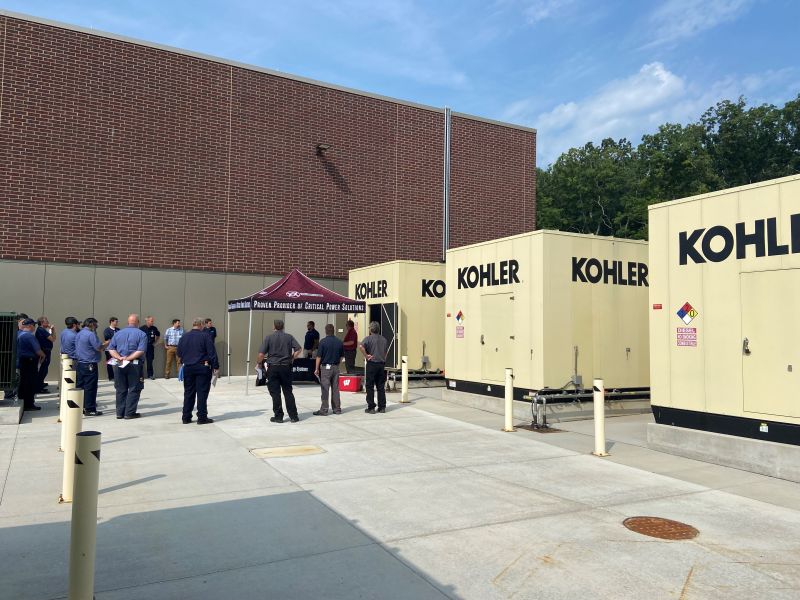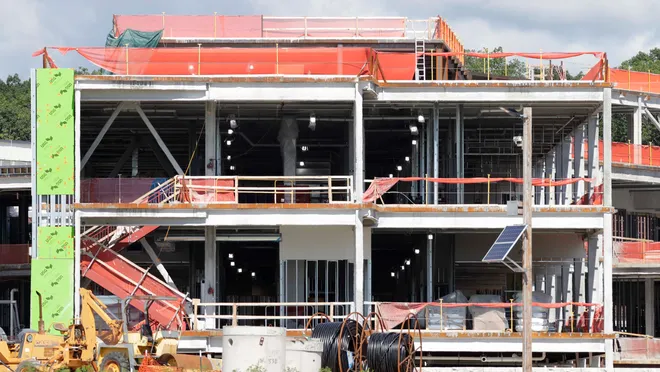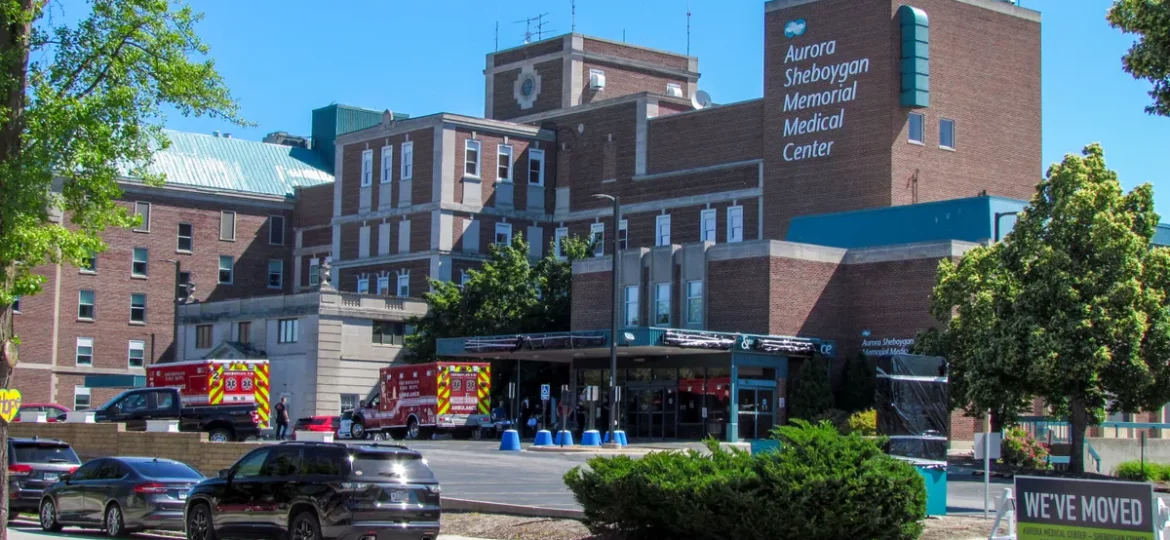When a local hospital decides to include a neonatal intensive care unit (NICU) for the convenience of catering to its most vulnerable patients within its facilities instead of referring them to a regional center situated 50 miles away, it invites immense faith from families who entrust it with the healthcare needs of their babies.
In similar fashion, the administrators of such hospitals need to be certain that they can efficiently operate their sophisticated technology and medical apparatus continuously, irrespective of the climate or the pressure on the utility grid.
See below a real case study, where the technical demands are high and where Kohler quality products can meet the high standards required.
“We’ve made a promise to our community to be here 24/7 to provide the highest quality of care, and in order to do that we need reliable power,” says Lori Knitt, chief support services officer at Aurora Sheboygan Memorial Medical Center in Sheboygan, Wisconsin.
Knitt discloses that the hospital likely experiences power surges around three to four times annually. In fact, a few years back, a squirrel caused a neighborhood transformer to explode. Although disruptions in utility services are typically short-lived, with most lasting less than a minute – just enough time to cause a blink on an alarm clock, they can cause a complete shutdown in the hospital.
“We rely on our KOHLER generators to keep everything running, and they’ve never failed,” she says. “When we lose power, I step into the hallway, take a deep breath, and by then the generator kicks in and the lights go back on.”
In the current landscape of healthcare, every aspect relies on electrical power. The NICU upscales the oxygen supply to babies with the use of continuous positive airway pressure (CPAP) machines, while bili lights assist in liver function. A Cesarean section, which often demands an anesthesia machine and multiple surgical instruments, could be needed without warning to aid a baby undergoing distress.

Before updating its backup power system in 2011, Aurora Sheboygan relied on two antiquated KOHLER generators. While they were still operational despite being 35 and 42 years old respectively, they were not able to match the hospital’s increased power capacity needs.
“It’s important to us that, even during a utility outage, our patients always have access to surgical, radiology, cardiology and CT services,” says Richard Miller, director of planning and operations for Aurora. “In addition to powering these critical functions, the new generators also ensure uninterrupted operation of fire alarms and patient room air conditioning.”
The project allows Aurora Sheboygan to meet the requirements for new healthcare infrastructure, a key factor as the organization is considering the construction of a new facility in the future. In addition, the backup power system is integrated completely, functioning flawlessly as all components, including the automatic transfer switches and custom paralleling switchgear, are KOHLER-branded, all of which are managed by KOHLER Decision-Maker controllers.
“KOHLER Power Systems are premier-grade, hence they were our top choice,” confirms Andy Nygaard, plant operations manager at Aurora Medical Center. “A single 600 kW generator from our new addition can cater to most of the hospital’s needs. The second one brings an extra level of redundancy and the capacity to switch on air conditioning or heating if necessary.”
As a part of the operation’s emergency preparedness plan, the hospital routinely inspects and tests its backup power system. This comprises weekly oil and battery checks, a monthly test run at 30 percent of the generators’ rated loads, and yearly preventive maintenance. “To sustain our certification with the Centers for Medicare & Medicaid Services and ensure that our generators are functional and all set to operate at any given moment, we must perform apt checks,” Miller emphasizes.
Located in eastern Wisconsin, the Aurora Medical Center is relatively safe from earthquakes. However, its KOHLER generators also adhere to the seismic requirements of the International Building Code designed for high-priority institutions like hospitals. KOHLER generator sets ranging from 20 to 3250 kW have passed rigorous shake tests at authorized seismic test labs to affirm their dependable performance post an earthquake.
Knitt concludes it simply. “Thanks to reliable emergency backup power, supplemented by an additional generator for redundancy, I can sleep more peacefully at night.”

KOHLER generators meet NFPA 110 requirements for critical operations including supplying power within 10 seconds of an utility outage.
KOHLER Generators: Meeting NFPA 110 Requirements for Critical Operations. Ensuring power continuity in life-sustaining operations in hospitals. KOHLER generators meet the stringent criteria set by NFPA 110 (Standard for Emergency and Standby Power Systems) comprehensively, with a unique capability of supplying power within 10 seconds of a utility outage.
Towards accomplishing this, KOHLER generators follow a systematic process. As soon as the utility power fails, an Automatic Transfer Switch (ATS), a key component in KOHLER’s power management system, swiftly detects the outage. Triggered by the ATS, the generator’s starter motor commences, cranking the engine in preparation for ignition. Once running, the onboard controller automatically synchronizes the generator’s electrical frequency and voltage to match the pre-outage utility levels, thus ensuring the safest and most efficient power provision. All of this, remarkably, within the crucial 10 seconds stipulated by NFPA 110 guidelines.
Unlike ordinary generators, KOHLER’s units are designed robustly to handle the extreme stress of reaching full-load in a minimal time frame without potential damage to the engine or causing instability in the power provision. This rapid load acceptance ability is instrumental in adhering to NFPA 110’s criteria and is primarily facilitated by the sophisticated engine control units and power management systems integrated into KOHLER generators.
Moreover, these generators come equipped with reliable battery systems that enable prompt startup even if they have been in standby mode for extended periods, thus abiding by the NFPA’s stringent requirement. The advanced battery charging and maintenance systems integrated into these units ensure that the start-up battery retains optimal power, allowing for instant powering of critical loads upon utility failure.
The adherence to NFPA 110 also mandates regular functional testing, which KOHLER generators are designed to conform to. Built-in testing programs alleviate the need for expensive and disruptive manual exterior load testing, thereby saving time and resources while validating the generator’s readiness consistently.
By satisfying these NFPA 110 requirements, KOHLER generators fortify the guarantee of energizing vital operations without delay during utility outages. This swift restoration of power is not only crucial to the overall safety of sensitive operations but also lends a peace of mind to the stakeholders as well.
Therefore, in the landscape where every second matters, the technical grandeur of KOHLER generators aligns seamlessly with NFPA 110 standards, delivering unparalleled reliability and efficiency in the realm of critical power backup solutions. Expressly designed and engineered for instant power provision, KOHLER enables the critical operations to continue undisrupted, preserving life, preventing data loss, and keeping indispensable services functioning swiftly and effectively, even in the face of unforeseen power outages.
Comprehensive Power Solutions for Aurora Hospital: A Technical Overview
The powerhouse bolstering the Aurora Hospital’s diverse energy demands constitutes two robust 600-kW KOHLER generators, paralleling switchgear, and automatic transfer switches, all under the premium KOHLER brand. Each component, engineered with precision, brings nuanced technical dimensions and functionalities to ensure consistent, high-quality power provision in the face of utility failures.
Embodying diligence and efficiency, the twin 600-kW KOHLER generators chart the backbone of this back-up power system. As the heart of the network, these generators pack immense power density, powered by highly advanced internal combustion engines. The generators can comfortably manage prominent power requirements, reaching full carrying capacity within 10 seconds of utility power loss, in compliance with NFPA 110 standards. Their air-cooled technology mitigates overheating, and built-in noise abatement maximizes efficiency while minimizing vibrational disruptions, offering a power solution that is simultaneously reliable, smooth, and quiet.
The installation also features proprietary KOHLER paralleling switchgear, a state-of-the-art power management tool focused on optimizing power distribution and stability. As the central routing hub, the switchgear seamlessly integrates the power produced by the generators, enabling them to work in parallel and share the load. By synchronizing the outputs, the switchgear ensures a steady stream of electricity devoid of harmful fluctuations. The switchgear’s protective relays safeguard the generators and circuits, inhibiting destructive incidents like overload, short circuit, or voltage drop. The technology’s proficiency empowers flexibility in the system, delivering a scalable architecture that accommodates future expansion opportunities without major system revamps.
Equally crucial in this set-up are the KOHLER automatic transfer switches, offering an innately proactive mechanism detecting any interruption in the primary power supply. Simultaneously, they initiate the start of the generators and switch power sources in mere seconds, ensuring an uninterrupted power flow. A key feature of KOHLER’s transfer switches is their high ratings for endurance and closing capacity, positioning them as highly reliable devices even under significant short-circuit current conditions. Additionally, they contribute to the preventive maintenance regimen by facilitating periodic test runs, ensuring the generators’ readiness status.
All these elements of the KOHLER system, bound together by a supreme quality assurance, coalesce into a sophisticated, fail-safe architecture that supports Aurora Hospital’s mission-critical operations. Their rugged construction permits them to handle the harshest operating conditions, their tech-savvy designs promote operational simplicity, and their silent operation encourages a peaceful environment. The components, although impressive individually, when brought together, produce a symphony that solidifies this power solution’s overall dependability.
The technical brilliance of the KOHLER equipment installed at Aurora Hospital underscores an all-encompassing approach. The generators’ power capacity, paralleling switchgear’s synchronization skills, and the transfer switches’ swift and sensible response collaborate holistically. This assures uninterrupted power, fortifying Aurora to battle unforeseen blackouts confidently and effectively, ultimately protecting patients’ well-being. Hence, the KOHLER system stands not just as a compilation of machines but as a testament to the marriage of advanced engineering, technical prowess, and unwavering commitment to delivering certified, top-notch power solutions.
If you require any technical assistance or have further inquiries of this type of projects, feel free to reach out to us. We’re available via the Whatsapp chat function on this page, email at info@bnhgenerators.com, and also by phone on +1.954.657.7777. We are always here to help!


